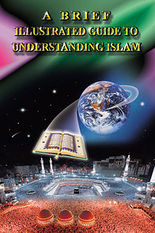Template:Pictorial-Islam-options: Difference between revisions
| [checked revision] | [checked revision] |
mNo edit summary |
mNo edit summary |
||
| Line 1: | Line 1: | ||
<noinclude>Also see: [[Template:Pictorial-Islam]]</noinclude><!-- HELP NOTES: Each option tag handles one random story --><choose> | <noinclude>Also see: [[Template:Pictorial-Islam]]</noinclude><!-- HELP NOTES: Each option tag handles one random story --><choose> | ||
<option weight="1">{{Pictorial-Islam|1=Speed of Light in the Qur'an|2=[[File:Speed of light.JPG|250px|link=Speed of Light in the Quran]]|3=In an article published in Islami City, Dr. Mansour Hassab-Elnaby claims verse 32:5 reveals that light in one day travels a distance equal to 12,000 lunar orbits, and upon calculating that distance we find the exact speed of light. Verse 32:5 has nothing to do with the speed of light. There is no mention of the moon, light or even distance in this verse. No matter how Dr. Hassab-Elnaby's calculations are viewed, they are mathematically incorrect. Even the notion of measuring the speed of light with the orbit of the Moon or the length of the day is a fallacy. Dr. Hassab-Elnaby also makes many deliberate errors to doctor a scientific miracle, and in his enthusiasm to ascribe miracles to the Qur'an, he discards the concept of Allah's omnipresence. Finally, assuming there really is a miracle in this plagiarized allegory, should not the credit go to the Bible from which it originates? ([[Speed of Light in the Quran|''read more'']])}}</option> | |||
Revision as of 02:28, 1 February 2014
Also see: Template:Pictorial-Islam
|
